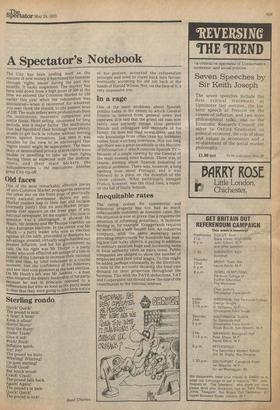A Spectator's Notebook
The City has been priding itself on the amount of new money it has raised for business through 'rights issues during the past few months. It looks suspicious. The market has been sold down from a high point of 500 at the time we entered the Common Market to 150 earlier this year when the referendum was. announced—when it recovered, for whatever you may think the reason, to the present level of 330. The main sellers were professionals from the institutions, insurance companies and major funds. Short selling, uncovered for long periods, was a major factor. The institutions that had liquidated their holdings were plainly unable to get back in volume without moving Prices against themselves. Just then it was sensible for the view to be encouraged that rights issues' might be appropriate. The main body of demoralised private shareholders were unable or unwilling to take up their rights leaving them as expected with the underwriters, and their main hackers, the subunderwriters — the institutions. Another great City rip-off.
Old faces
One of the most remarkably effective pieces of anti-Common Market propaganda appeared the other day on the front page of practically every national newspaper. Before my antiMarket readers leap to their feet and exclaim (normally justly) that no anti-Market propaganda ever appears on the front page of any national newspaper, let me explain. The item in question was a photograph. It showed Mr Heath, Mr Jenkins and Mr Thorpe, together on a pro-European platform. In the centre was Mr Heath — a party leader who won an election against all the odds, proceeded to dissipate his advantage, created, virtually single-handed our Present inflation, and led his government to ruin. On his right was Mr Thorpe — a party leader who took effective advantage of a tide in favour of the Liberals to increase their national vote and then, by total indecision at a crucial moment, lost the confidence of his followers and saw that vote plummet at the next election. On Mr Heath's left was Mr Jenkins — a man who resigned the deputy leadership of his party because he was in principle opposed to a referendum but who, as soon as the party made it clear that they were going to take little notice
Sterling rondo.
Quick! Quick! The pound is sick!
A boat! A boat!
Keep it afloat!
Hurry! Hurry! Stop the flurry! Trade! Trade!
Give it aid!
Prick! Prick!
Inflation quick. Joy! Joy! The pound we buoy. Whirling! Whirling! Up goes sterling! Good! Good!
But touch wood!
Crack! Crack!
The pound falls back.
Again! Again! The pound's in pain. Quick! Quick! The pound is sick! of his gesture, accepted the referendum principle and tried to crawl back into favour, eventually accepting his old job back at the hands of Harold Wilson. Not, on the face of it, a very impressive trio.
In a rage
One of the main problems about Spanish politics today is the extent to which General Franco is isolated from general news and comment. It is said that the grand old man now rarely sees anybody except close personal friends and colleagues and niembel-s of his family. He does not read newspapers, and his sole knowledge from other than his intimates comes from watching television. Not too long ago there was a great taradiddle in the Ministry of Information — which controls Spanish TV — because of a single viewing by the General of the main evening news bulletin. There was, of course, nothing about Spanish industrial or political problems. There was, however, a long opening item about Portugal, and it was followed by a piece on the downfall of the Greek colonels. What particularly enraged Franco, however, was the third item, a report on the fall of Hailie Selassie.
Inequitable rates
The rating system for commercial and industrial property has not had as much unfavourable comment as domestic rates. But the situation is now so grave that it requires the attention of reforming politicians. A business dealing in, for example, Kruggerands requires no more than a safe deposit box. An industrial company, with the same monetary sales providing employment for hundreds but making low cost bulky objects, is paying in addition to ordinary taxation huge and increasing sums in local authority rates as extra taxes. Public companies are obliged to show the number of employees and their total wages. To this might be added, perhaps voluntarily by the Directors, a note to the accounts showing the total rate demand for their properties throughout the business. This with the PAYE deductions, VAT and Corporation tax should show the size of the contribution to the national interest.


























 Previous page
Previous page